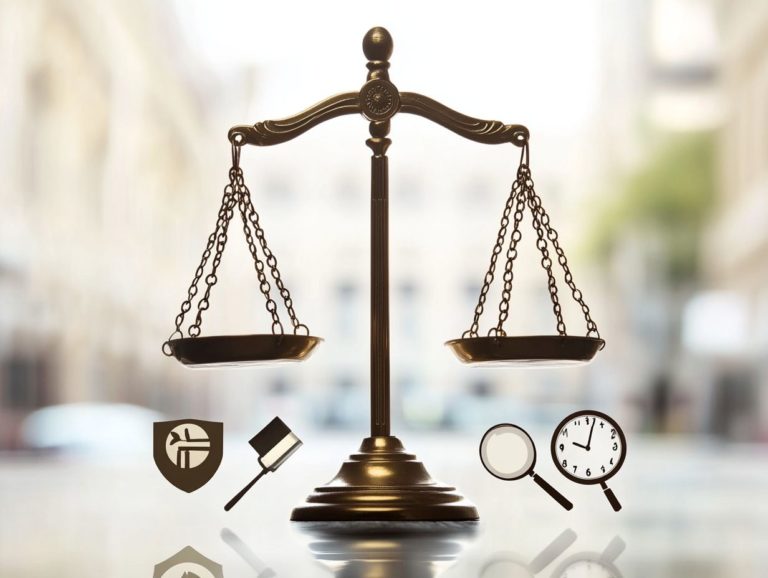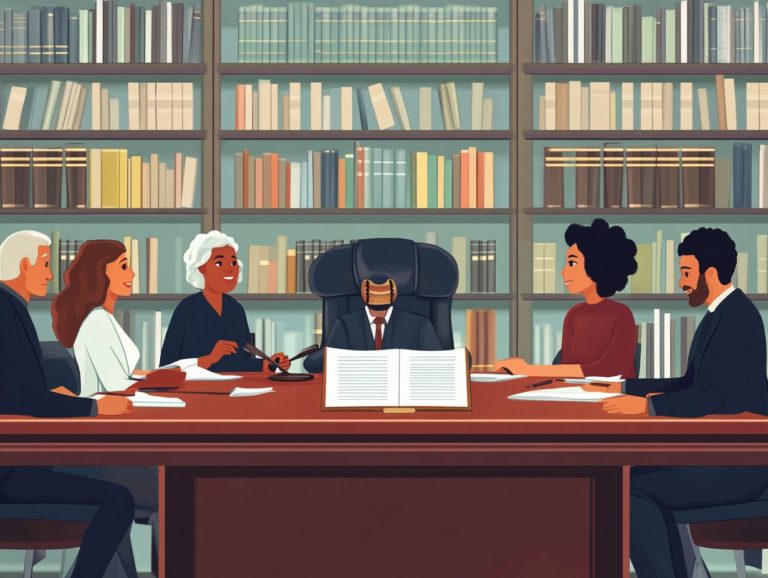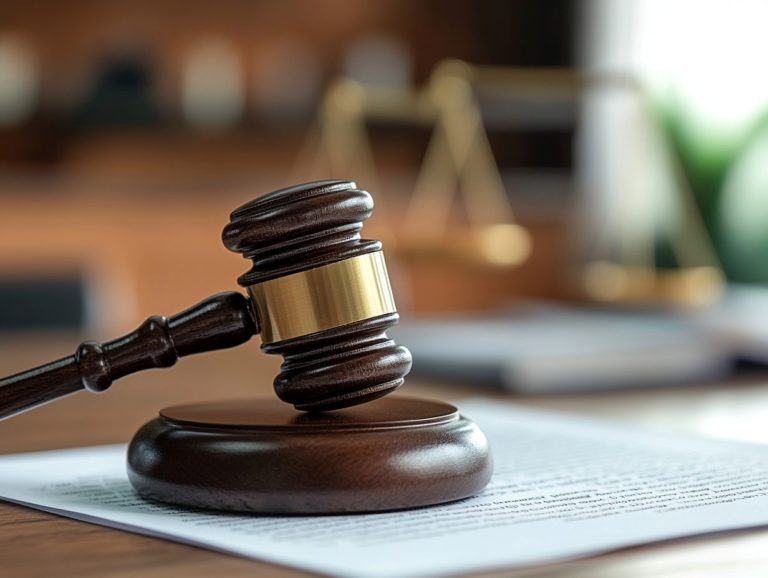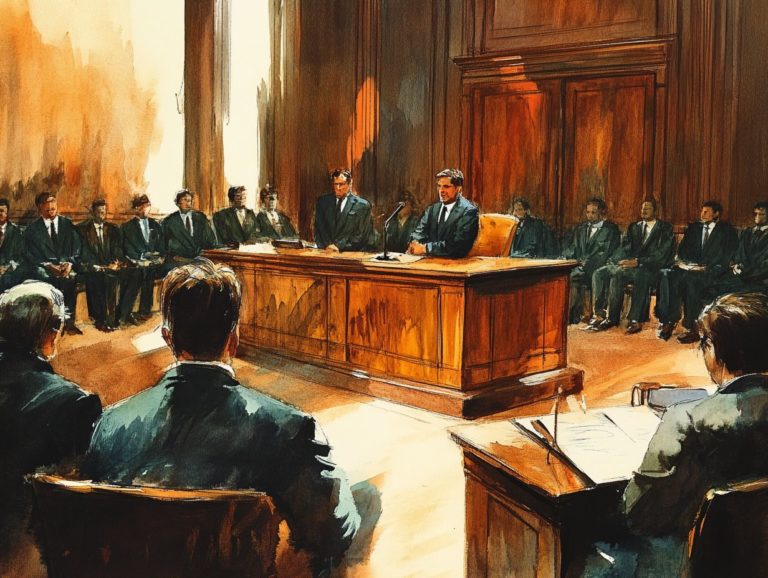What Are Your Rights If You’re Wrongly Accused?
Wrongful accusations can truly shake the very foundation of your life, often leading to serious emotional, social, and legal consequences.
Understanding the nuances of wrongful accusations is crucial if you find yourself in such a predicament. This article breaks down what constitutes a wrongful accusation, explores your legal rights including the presumption of innocence and the right to a fair trial and provides practical steps to take if you are wrongly accused.
It delves into the potential impacts on both your personal and professional life. Additionally, it offers tips on how to prevent false accusations from happening in the first place.
Empower yourself with knowledge and learn how to navigate these challenging situations effectively.
Contents
Key Takeaways:
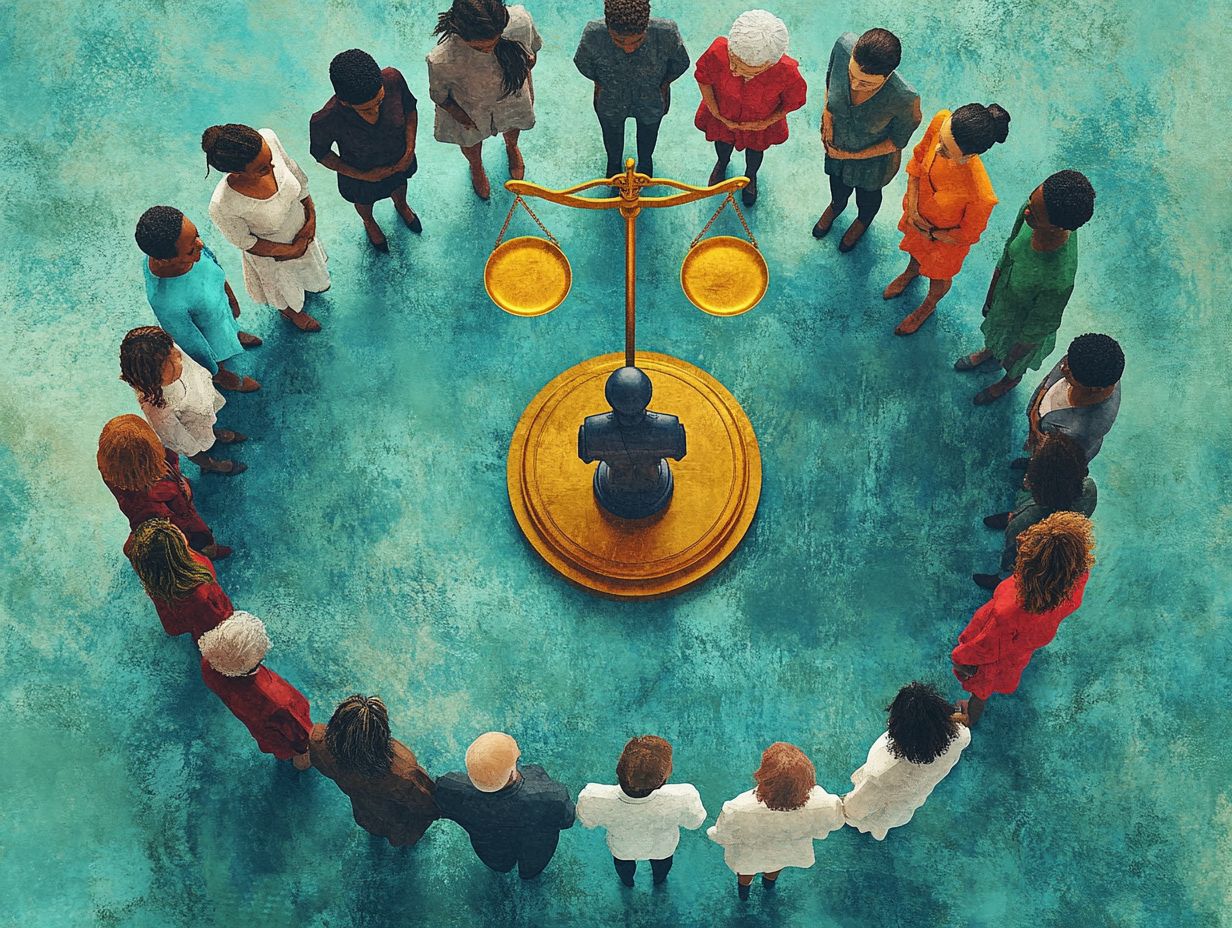
- Presumption of Innocence: When accused of a crime, you are innocent until proven guilty in a court of law. The burden of proof lies on the accuser, not the accused.
- Right to Legal Representation: You have the right to an attorney to defend yourself against wrongful accusations. It’s important to seek legal help immediately to protect your rights and build a strong defense.
- Gather Evidence: If falsely accused, gather evidence and document everything that can help prove your innocence. This can include witness statements, surveillance footage, or any other relevant information.
Understanding Wrongful Accusations
Wrongful accusations can profoundly affect your life, reverberating through both your personal and professional realms. When faced with a false accusation, the toll on your reputation and emotional well-being can be particularly devastating.
Often, these accusations stem from false statements, misunderstandings, or even malicious intent. It s essential to understand the nature of these allegations and your legal rights, especially within the framework of Texas laws that govern such sensitive matters.
Defining Wrongful Accusations
Wrongful accusations refer to allegations made against you that lack factual evidence. These claims can arise from misunderstandings, malice, or simple mistakes and can include a wide array of scenarios, such as false accusations of theft, assault, or fraud.
Imagine being accused of shoplifting simply due to a misinterpretation of your behavior. This not only tarnishes your reputation, but it can also lead to emotional distress and financial hardship.
Navigating the legal process in these circumstances is essential. You ll need to consider how to clear your name through formal procedures, which might involve gathering evidence, securing witness testimonies, or even pursuing defamation claims against the accuser.
Understanding the details of wrongful accusations gives you the power to take decisive action toward justice. It allows you to seek remedies that restore your dignity and peace of mind.
Legal Rights of the Accused
Knowing your legal rights can turn the tide in your defense, especially when facing wrongful accusations. The presumption of innocence is a cornerstone principle, ensuring you aren’t deemed guilty until proven otherwise.
This principle protects your legal rights throughout the judicial process. Having the right to legal representation is vital; it allows you to consult a defense attorney who can expertly navigate the complexities of your case.
The right to a fair trial is equally important, guaranteeing that you have a platform to present your case without bias.
Presumption of Innocence
The presumption of innocence is a fundamental legal principle that requires individuals accused of crimes to be regarded as innocent until proven guilty. This concept underpins the fairness and integrity of the legal system.
By placing the burden of proof on the prosecution, it safeguards the rights of the accused. It also acts as a vital check on law enforcement’s powers and the judiciary’s decision-making.
In instances of wrongful accusations, this principle takes on even greater importance. It underscores the necessity for thorough investigations and discourages snap judgments.
This principle compels law enforcement to back up their claims with compelling evidence. It ensures judges and juries maintain impartiality, creating an environment where justice triumphs over mere assumption.
If you or someone you know is facing wrongful accusations, seeking legal advice is crucial to navigating this challenging situation.
Right to Legal Representation
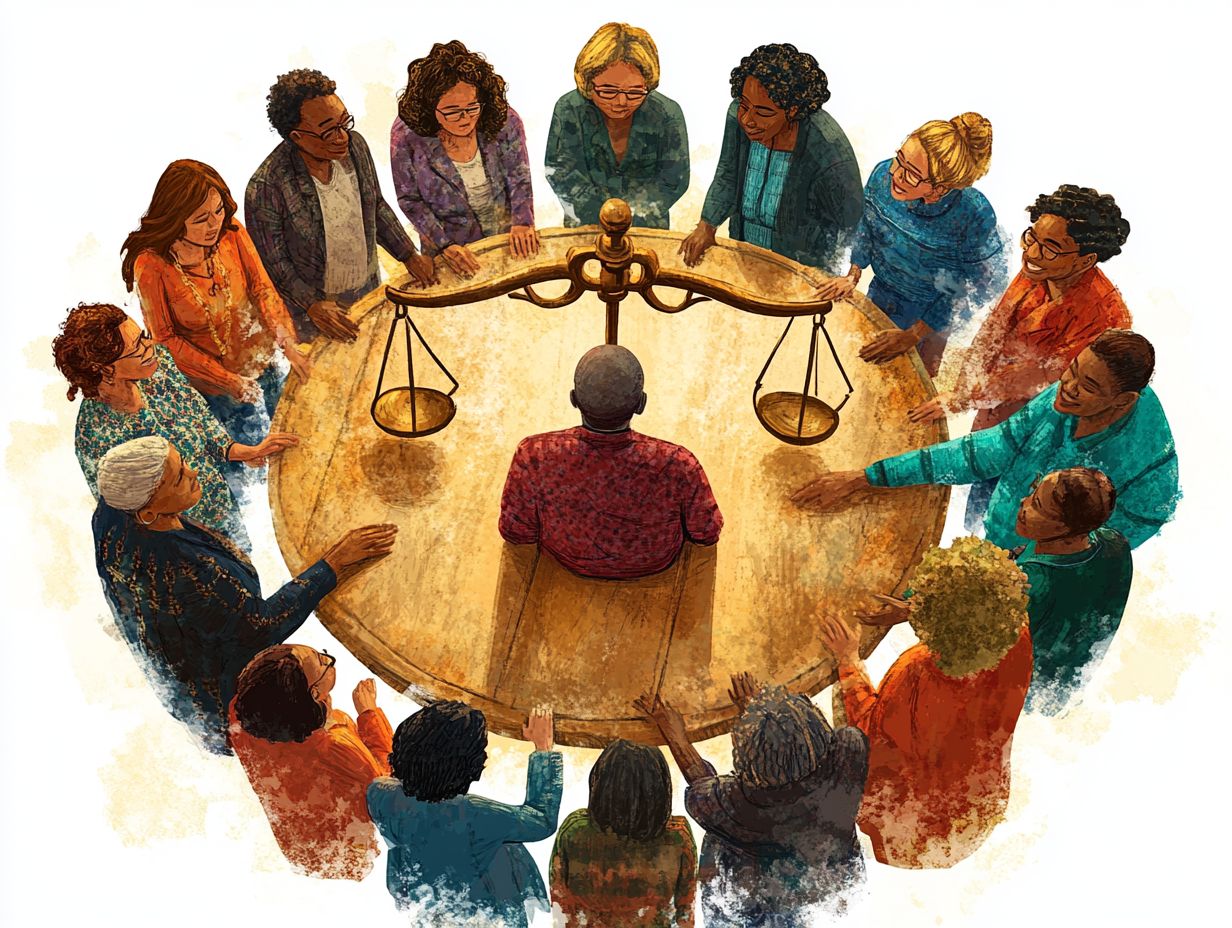
The right to legal representation guarantees that you, as an individual accused of a crime, have access to a defense attorney who can offer vital legal guidance. This legal advocate plays a crucial role in protecting your rights, especially in situations where wrongful accusations could lead to serious repercussions.
A skilled defense attorney doesn t just interpret the law; they dive deep into the facts surrounding your case. They craft a robust defense strategy tailored specifically to your unique circumstances.
The relationship you have with your attorney is fundamental. Open communication fosters trust, allowing them to grasp your perspective and concerns fully. It s essential for both of you to work collaboratively, as their success in navigating legal challenges often depends on the information you provide. This ensures that your rights are upheld throughout the judicial process.
Right to a Fair Trial
The right to a fair trial stands as a cornerstone of the judicial process, ensuring that you, as an individual facing criminal charges, receive an unbiased and just hearing.
This right is a vital safeguard against wrongful convictions, giving you the power to present your case before impartial judges and juries. When the judicial system functions without bias, the chances of errors decrease significantly, helping to avert the tragic consequences of unjust punishments.
An impartial tribunal carefully listens to the evidence, weighs arguments fairly, and delivers a verdict grounded in fact rather than prejudice.
This fundamental principle highlights the need for clear and fair legal processes, safeguarding the rights of those wrongfully accused while fostering public confidence in the legal system.
Steps to Take When Wrongly Accused
When confronted with wrongful accusations, it s essential that you act swiftly and thoughtfully to protect your legal rights and reputation.
Start by gathering evidence that affirms your innocence. This could include witness testimonies or physical proof that undermines the false claims against you.
Engaging a qualified defense attorney is crucial! Their expertise will help you create a strong defense plan tailored to your unique circumstances.
Remember, collecting evidence is not just important; it can profoundly impact the outcome of your case.
Gathering Evidence
Gathering evidence is an essential step in defending against wrongful accusations, providing you with the necessary proof to assert your innocence. This process entails various methods, each playing a pivotal role in constructing a robust defense strategy.
- Collecting documents such as emails, texts, or official records allows you to create a clearer narrative of the events in question.
- Eyewitness statements carry significant weight, offering real-time accounts that can either corroborate or challenge the claims made against you.
- Securing alibi witnesses people who can confirm your location at the time of the alleged incident further bolsters your defense.
Diligent evidence collection not only fortifies your case but also instills confidence in the legal process, equipping you to effectively challenge any unfounded allegations.
Seeking Legal Help
Seeking legal help is crucial when confronted with wrongful accusations, allowing you to receive the expert advice necessary to navigate your case with confidence.
By consulting a skilled defense attorney right away! You’ll gain a clearer understanding of your rights and options. This proactive approach can significantly reduce the risk of missteps that might adversely affect your case.
During initial consultations, you can anticipate an in-depth discussion about the accusations against you, the potential legal ramifications, and tailored strategies designed specifically for your situation.
With experienced legal representation, you not only gain clarity but also enhance your chances of a favorable outcome! Ensure that every possible avenue for defense is thoroughly explored.
Consequences of Wrongful Accusations

The consequences of wrongful accusations reach far beyond mere legal repercussions. They often inflict profound emotional and psychological distress on the accused.
When individuals find themselves wrongly accused of crimes, they can suffer significant damage to their reputation. This can dramatically affect their standing within the community and disrupt both personal and professional relationships.
The emotional burden of navigating such allegations is heavy. It can potentially lead to enduring psychological effects, including anxiety and PTSD. Recognizing these consequences is crucial for understanding the full effect of wrongful accusations.
Impact on Personal and Professional Life
Wrongful accusations can have devastating effects on both your personal and professional life. They impact relationships and career opportunities in ways you might never have anticipated.
These baseless claims can erode the trust you’ve built with friends and family, leading to questioning of loyalty and strained connections.
Imagine being isolated from your support system due to false claims. It s a terrifying scenario that could happen to anyone.
In the workplace, consider the case of an employee falsely accused of misconduct. They may find themselves shunned by colleagues, facing disciplinary actions, or even losing their job.
These situations underscore the fragility of professional reputations. A single accusation can upend lives and leave enduring emotional scars.
Preventing Wrongful Accusations
Preventing wrongful accusations is crucial for safeguarding your reputation and ensuring fair treatment within the legal system.
By understanding the common causes of false accusations, you can take proactive steps to reduce the risk of being wrongly accused. This involves maintaining clear communication in your relationships and staying aware of your surroundings.
Familiarizing yourself with your legal rights regarding wrongful accusations can empower you to respond effectively should you ever find yourself in such a situation.
Tips for Avoiding False Accusations
- Clear communication is essential. Engage in open dialogue with colleagues, friends, or acquaintances to ensure your intentions are understood.
- Document your interactions whether through text messages, emails, or meeting notes as vital evidence if disputes arise.
- Educate yourself about your legal rights. Understanding these can help you navigate challenging situations with confidence.
By utilizing these strategies, you foster a sense of security and create an environment of trust. This reduces the likelihood of unwarranted blame and enhances your personal and professional life.
Frequently Asked Questions
What are my rights if I’m wrongly accused?
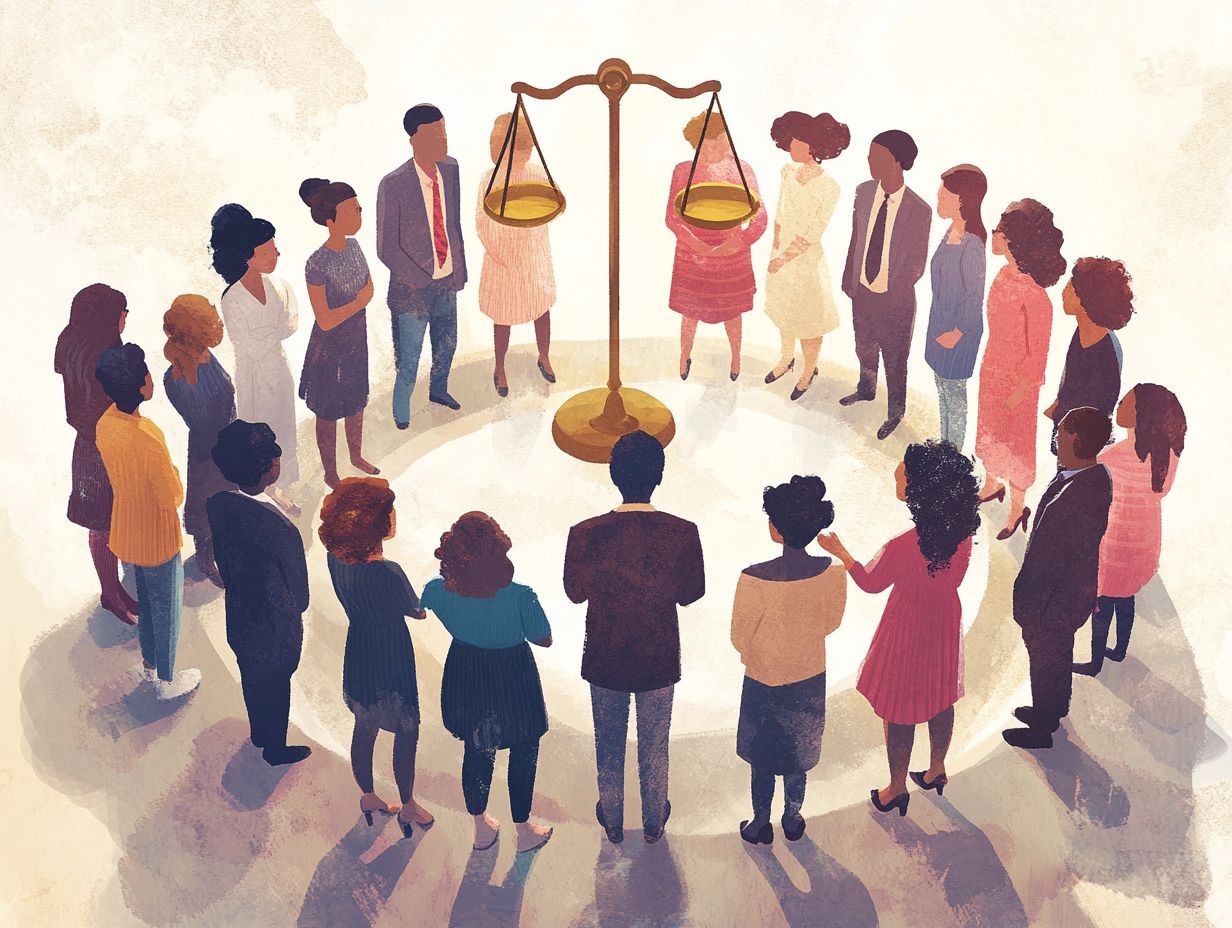
If you’ve been accused of a crime you did not commit, you have the right to a fair trial and to be presumed innocent until proven guilty.
Can I be arrested if I’m wrongly accused?
If there is sufficient evidence against you, the police may still arrest you even if you maintain your innocence. However, you have the right to remain silent and to have legal representation during the arrest and interrogation process.
Am I entitled to a lawyer if I’m wrongly accused?
Yes, you have the right to a lawyer regardless of your ability to pay. If you cannot afford a lawyer, one will be appointed to you by the court.
What if my rights are violated during the investigation process?
If you believe your rights have been violated during the investigation process, you have the right to file a complaint with the appropriate authorities. It is important to document any evidence of misconduct or violation of your rights.
Stay informed and protect yourself from the risks of wrongful accusations today!
Can I sue for being wrongly accused?
If you can prove you suffered damages, like lost income or harm to your reputation, you might have a case.
You can sue the person who accused you or the law enforcement agency.
What happens if I’m found not guilty?
If you are found not guilty after a trial, you can seek compensation for the damages you faced.
You might also be able to clear your record of the wrongful accusation.



